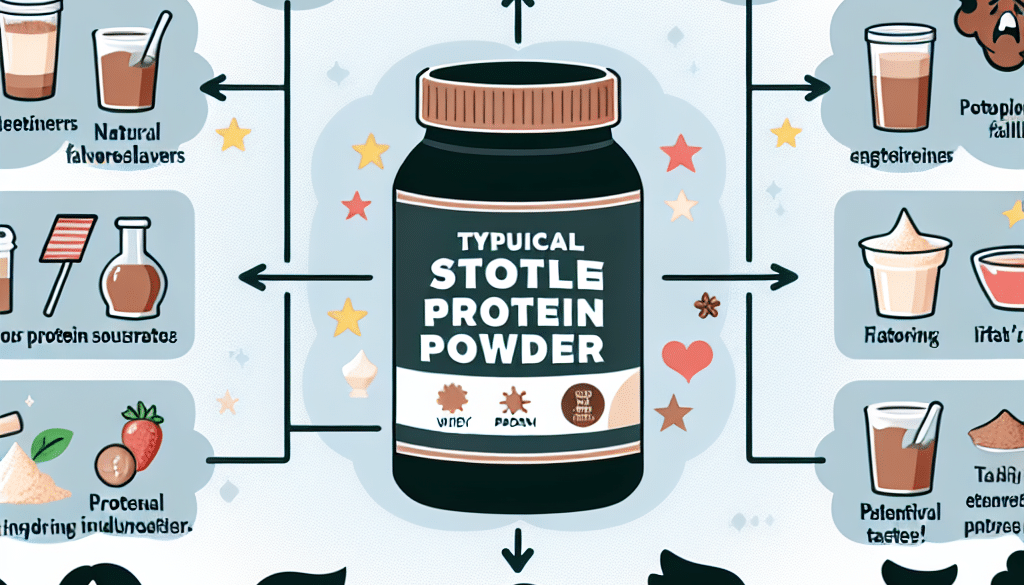Protein Powder Taste: Why It’s Not Always Pleasant
-
Table of Contents
- Protein Powder Taste: Exploring the Challenges and Solutions
- Understanding Protein Powder Ingredients
- The Science Behind Protein Powder Taste
- Case Studies and Consumer Feedback
- Improving Protein Powder Taste: Strategies for Manufacturers
- Choosing the Right Protein Powder: Tips for Consumers
- Statistics and Market Trends
- Conclusion: The Future of Protein Powder Taste
- Try ETprotein for Quality and Taste
Protein Powder Taste: Exploring the Challenges and Solutions

Protein powders have become a staple in the diets of athletes, bodybuilders, and health-conscious individuals. They are a convenient way to ensure adequate protein intake, especially when whole food sources are not readily available or practical. However, despite their popularity and nutritional benefits, many users often complain about the taste of protein powders. This article delves into the reasons behind the less-than-pleasant taste of some protein powders and explores how consumers and manufacturers can overcome this challenge.
Understanding Protein Powder Ingredients
Before we can address the taste issue, it’s important to understand what goes into a protein powder. Protein powders are derived from various sources, including whey, casein, soy, pea, rice, and hemp. Each source has its unique flavor profile, which can affect the overall taste of the powder. Additionally, protein powders may contain other ingredients such as sweeteners, flavorings, thickeners, vitamins, and minerals, which can also influence taste.
The Science Behind Protein Powder Taste
The taste of protein powder is influenced by several factors, including the source of the protein, the presence of additives, and the individual’s taste preferences. Here are some reasons why protein powder might not always taste great:
- Protein Source: Different protein sources have distinct flavors. For example, whey protein often has a milky taste, while plant-based proteins like pea or hemp can have earthy or nutty undertones.
- Amino Acid Composition: Certain amino acids, such as leucine, have a bitter taste. Protein powders high in these amino acids may taste more bitter.
- Processing Methods: The way protein is extracted and processed can affect its flavor. High heat or chemical treatments can lead to a more pronounced taste.
- Additives: Some protein powders contain artificial sweeteners, flavors, or other additives that can leave an unpleasant aftertaste.
- Flavor Masking: The challenge of masking the natural flavors of protein can lead to an imbalance in taste when not done correctly.
Case Studies and Consumer Feedback
Consumer reviews and case studies often highlight the taste issue with protein powders. For instance, a study on consumer preferences for whey protein found that taste was a significant factor in product satisfaction. Many users report a chalky or gritty texture, which can be off-putting. Additionally, some consumers are sensitive to the taste of artificial sweeteners commonly used in protein powders, which can lead to a negative perception of the product’s taste.
Improving Protein Powder Taste: Strategies for Manufacturers
Manufacturers are constantly seeking ways to improve the taste of protein powders. Here are some strategies they employ:
- Flavor Development: Investing in research and development to create more natural and appealing flavors.
- Quality Ingredients: Using high-quality protein sources and natural sweeteners can improve taste.
- Advanced Processing Techniques: Utilizing low-temperature processing methods to reduce the denaturation of proteins and preserve their natural taste.
- Texture Enhancements: Improving the solubility and texture of protein powders to avoid grittiness.
- Consumer Testing: Conducting extensive taste tests with target audiences to refine flavors.
Choosing the Right Protein Powder: Tips for Consumers
Consumers can also take steps to find a protein powder that suits their taste preferences:
- Sample Packs: Trying sample sizes of different flavors and brands to find the most palatable option.
- Ingredient Awareness: Reading labels to avoid powders with ingredients known to cause bad tastes.
- Mixing Techniques: Blending protein powder with flavorful ingredients like fruits or cocoa powder to improve taste.
- Product Reviews: Consulting online reviews and recommendations to gauge the taste of different powders.
Statistics and Market Trends
The global protein supplement market is growing, with a projected CAGR of around 8% from 2021 to 2028. This growth is partly due to the increasing awareness of health and fitness, but also because manufacturers are improving the taste and texture of their products. According to market research, taste remains one of the top three considerations for consumers when purchasing protein powders, alongside price and protein content.
Conclusion: The Future of Protein Powder Taste
The taste of protein powder is a complex issue influenced by various factors. While not all protein powders taste great, ongoing advancements in food science and technology are helping manufacturers create better-tasting products. Consumers also have a role to play by choosing products that align with their taste preferences and using creative mixing techniques to enhance flavor.
For those seeking high-quality and great-tasting protein powders, ETprotein offers a range of products that cater to diverse needs. Their commitment to using natural ingredients and advanced processing techniques ensures that their protein powders not only provide nutritional benefits but also meet the taste expectations of consumers.
Try ETprotein for Quality and Taste
If you’re in search of a protein powder that doesn’t compromise on taste, consider ETprotein’s offerings. Their extensive range of plant-based proteins is designed to provide a neutral taste, making them an excellent choice for those who are sensitive to the strong flavors often associated with protein supplements. With non-GMO and allergen-free options available, ETprotein caters to a wide audience, including those with dietary restrictions.
About ETprotein:
ETprotein, a reputable plant protein vegan protein Chinese factory manufacturer and supplier, is renowned for producing, stocking, exporting, and delivering the highest quality organic bulk vegan protein and plant proteins. They include Organic rice protein, clear rice protein, pea protein, clear pea protein, watermelon seed protein, pumpkin seed protein, sunflower seed protein, mung bean protein, peanut protein etc. Their offerings, characterized by a neutral taste, non-GMO, allergen-free attributes, cater to a diverse range of industries. They serve nutraceutical, pharmaceutical, cosmeceutical, veterinary, as well as food and beverage finished product distributors, traders, and manufacturers across Europe, USA, Canada, Australia, Thailand, Japan, Korea, Brazil, and Chile, among others.
ETprotein specialization includes exporting and delivering tailor-made protein powder and finished nutritional supplements. Their extensive product range covers sectors like Food and Beverage, Sports Nutrition, Weight Management, Dietary Supplements, Health and Wellness Products, and Infant Formula, ensuring comprehensive solutions to meet all your protein needs.
As a trusted company by leading global food and beverage brands and Fortune 500 companies, ETprotein reinforces China’s reputation in the global arena. For more information or to sample their products, please contact them and email sales(at)ETprotein.com today.












